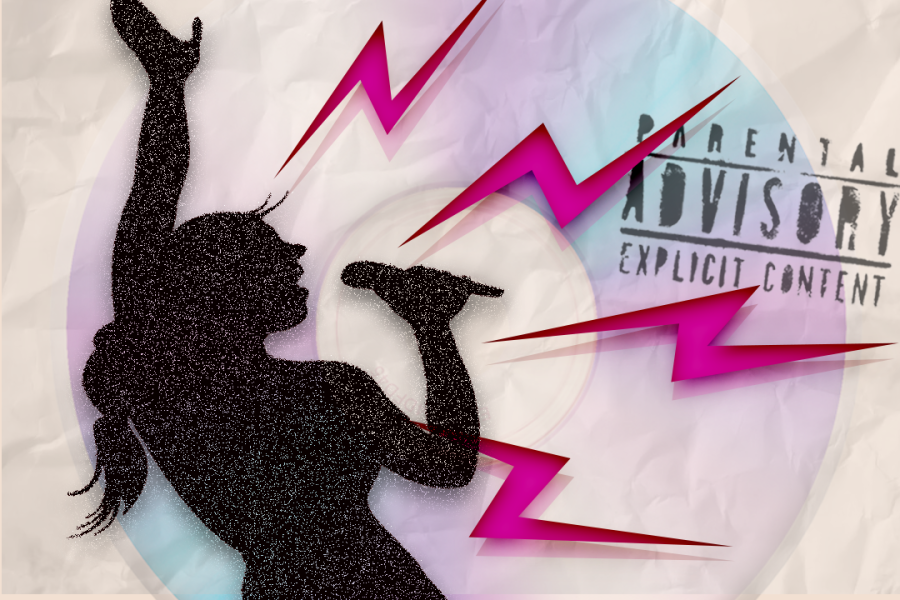Scream Rap Should Be Feminist
Musical genre “scream rap” is gaining popularity, but women don’t seem to be in the picture. This needs to change.
May 4, 2022
Women have a lot to be angry about. Every day, women suffer at the hands of misogyny in the workplace, on the street and even in personal relationships. The public expression of anger, however, does not reflect the scope of the fury that women experience daily. Studies examining the levels at which men and women express anger have found that women tend to suppress their anger more often than men do, and are often discouraged by outward sources from such expression.
In regards to artistic expression of anger, the trend of repressed expression becomes clear in the lack of women who produce “angry” artwork, particularly within the music industry. Though women are more frequently breaking into traditionally male-dominated, aggressive musical genres such as rap and heavy metal, it is not happening fast enough.
To fully understand the significance behind the gaping absence of angry female musicians, it is important to first understand what “angry” music is and why it is characterized as traditionally male-dominated.
By angry music, I mean music with aggressive lyrics, themes, and oftentimes an abrasive and energetic sound. This theme stretches across various male-dominated genres, including artists and bands such as Metallica, Jasiah, Kanye West, and Mötley Crüe.
Though the genres of heavy metal and rap come from different decades and are characterized by different instruments and sounds, they share a few central commonalities: they attract angry audiences, and they are both male-dominated. Both genres also have a history of objectifying women. From these two scenes, a new musical movement emerged: trap metal. The patriarchal nature of its two parent genres created a medium that was even harder for women to break into.
Trap metal rose to popularity in the early 2010’s, with XXXTentacion (often referred to as X) being the most notable artist that achieved mainstream fame. Very much representative of the genres of emo rap and trap metal themselves, X was surrounded by controversy throughout his career due to his sexist remarks and allegations of sexual violence, among other accounts of physical violence and legal issues.
After being accused of sexual abuse and domestic battery by his former partner, he responded with, “Women may see or feel that they’re belittled, but you’re only belittled if you want to be belittled.”
This sentiment is reflected by individual artists as well as artistic groups within the industry; incendiary rapper Lil Darkie and his musical group, Spider Gang, came out with the song “Methhead Freestyle” in 2019 that included violent and offensive lyrics that demean women and condone assault. The artist released another song, Genocide, with similarly explosive lyrics that contributed to backlash and the resulting temporary ban by Spotify on Lil Darkie’s creator account.
Scream rap is by and large one of the most violently sexist musical genres not only in content, but also in representation. Lil Darkie’s Spider Gang, though promoting fourteen musicians, has yet to include a female artist in the collective. Deathproof Inc., another independent label that trap metal artists Jasiah and Nasar Aloe are signed to, faces a similar issue with representation. Though the collective boasts a variety of up-and-coming artists across genres and collaborates with female artists, the group only has one female musician, BluShakurx.
Riot Grrrl music, an underground feminist outgrowth of punk rock, sparked incendiary discussion of feminist issues through their music.
Due to the fact that music can now be easily produced and released without regulation on Internet platforms, statistical data available on gender demographics within the music industry is very limited and often not reflective of the true scope of the population of female musical artists. For this reason, it is important to look at the image presented by collectives who are actively promoting individuals within the industry.
Because these groups provide artists with a platform to develop their work, they have the potential to influence the demographic trends present within the industry. Therefore, it falls onto these collectives to uplift female artists and provide them with the resources available to male artists who already enjoy membership.
There is another avenue for change. Methods of feminist resistance have long been present within the parent genres of this new musical style. Riot Grrrl music, an underground feminist outgrowth of punk rock, sparked incendiary discussion of feminist issues through their music. The genre is a rejection of traditional feminine ideals. It is loud, it is angry and it is violent and aggressive. It is made by women, for women and about women.
In order to achieve equality, women must identify and express their anger. In this sense, scream rap is liberative and helpful.
There is possibility for a feminist movement within scream rap. If not through integration with the help of influential, inclusive collectives, then through the separation and formation of a feminist trap metal. And the movement is on the brink of change; the wild popularity of Rico Nasty, a now-mainstream scream rapper with a feminine “sugar trap” aesthetic and famously loud voice. She broke into the industry, indicating that integration is possible; however, she does so at the expense of other women.
Though her songs evoke energy and confidence, many of her lyrics are degrading to other women. If she focused on empowering women, or at least abstained from degrading them, the possibility of integration could become more lucrative among female musicians that identify with the anger expressed in scream rap.
Anger acts as a fuel for change. It indicates that the angry person has dignity, and is aware of it. In order to achieve equality, women must identify and express their anger. In this sense, scream rap is liberative and helpful. And there must be a place for women in it.
Music should not be a boy’s club.














Frederik • Sep 17, 2022 at 12:23 am
Lil darkie is chill as hell, he’a an incredibly nice person and although the lyrics and stereotypes of him are sometimes bad he uses his music to express his anger and thoughts (AS YOU SAID WOMEN SHOULD IN THE ARTICLE, AND SOME OF THEM DO)
Frederik • Sep 17, 2022 at 12:18 am
This seems like something a high schooler would write, there is absolutely no evidence to back this up, also r can make scream music whenever they want to, they just chose not too, there also seem to be WAY too many biases.
Sucks • Sep 17, 2022 at 12:20 am
Also really, Kanye as a scream rap example like what?!!? I mean jasiah totally but KANYE?!!?
Guav • Jun 11, 2022 at 6:00 pm
Insert clown face emoji
joe • May 17, 2022 at 7:48 pm
who ever wrote this is an absolute oogley boogley imbecile. Men suicide rates are much higher than women so your “women have a lot to be mad about” argument is bs. And maybe there would be a female spider gang member if there were good female rappers that dont just rap about their pussy.
mamma • May 20, 2022 at 10:25 pm
fax
is • May 20, 2022 at 10:25 pm
straight up
mamma • May 20, 2022 at 10:26 pm
this guy is spitting straight fax